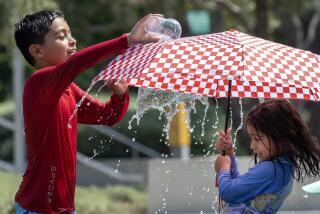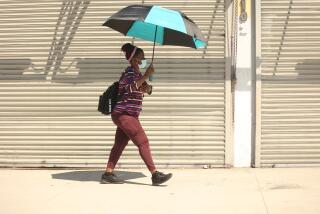When the Temperature Rises : Health: Heatstroke can be fatal. Heat exhaustion is less severe but still dangerous. Some simple steps can prevent serious complications.
- Share via
Ignoring the symptoms of exposure to excessive heat can be a costly mistake. The combination of blistering heat and oppressive humidity can leave people wilting from heat exhaustion and the more severe, and sometimes even fatal, heatstroke.
As the mercury rises, so do heat-related illnesses. In one of the worst instances, nearly 1,300 people died in the summer of 1981 when a heat wave gripped most of the nation for several weeks.
The beginning of the summer when the hot weather first hits is one of the riskiest times for heat problems because it can take two to three weeks for the body to adjust to hotter temperatures.
“Early in the season, people are not as acclimatized to the heat,” said Allen Walker, director of the pediatric emergency room at Johns Hopkins Children’s Medical Center. “You really need to be careful for the first three to four weeks of hot weather, before you get used to it.”
Those at particular risk are the elderly and the very young, who simply don’t “have as much margin to work with in terms of dehydration,” said Toni Mitchell, director of the adult emergency care center at Tampa General Hospital in Florida.
Anyone, however, can succumb to heat. Forget to drink enough water or fluids, indulge in a little too much physical exertion or linger in the sun too long and you too can find yourself lying prostrate, feeling faint and sick from a heat-related illness.
The average body contains 2 million sweat glands, which pump copious amounts of water when the thermometer soars. For example, a man resting in the shade in 100-degree desert weather loses about one cup of water every hour, according to Army studies. Strolling at a leisurely mile pace in the same weather, he loses one quart an hour.
Sweating serves an important purpose. The water released by these tiny glands evaporates on the skin, cooling it and also venting heat from the blood. Overload this system, however, or tamper with it by taking some common medications, and the body can suddenly lose its chief means of getting rid of heat.
Humidity further complicates the process. That’s why a hot, muggy day provides the perfect prescription for stressing the body. With so much water in the air, there is no place for the sweat to evaporate, and heat has a harder time escaping from the body.
What can quickly develop is heat exhaustion, a condition that can hit anyone from the well-conditioned athlete to the couch potato. The symptoms include profuse sweating followed by suddenly feeling light-headed, dizzy, nauseated and weak. Headaches are common. Those affected can also feel irritable and feisty and may resist efforts to get them to cool off.
“Those are the things that are the major warning signs, that’s when you should really start pushing a lot of fluids,” Mitchell said.
Drinking water is the first line of treatment. It should be cool, not necessarily iced. The point is to quickly replace fluids lost through sweating and dehydration.
Moving out of the sun is also crucial to helping lower body temperature. That means going into the shade, sitting in front of a fan (which reduces body temperature through evaporation) or, best of all, moving indoors to air conditioning.
“The secret is to get the skin cool,” said Robert E. Burr, a researcher at the U.S. Army Research Institute of Environmental Medicine in Natick, Mass. “Removing clothes is one way to do it. Or turning a garden hose on clothes will do it, too.”
Indoors, taking a tepid shower or bath can quickly lower body temperature.
In the majority of cases, recovery from heat exhaustion is quick. Most people “will feel much, much better in 15 to 20 minutes,” Burr said. And while doctors don’t recommend resuming physical activity immediately--rest is essential for keeping body temperature low--most people recover fully by the next day.
Any indication that symptoms aren’t improving warrants an immediate visit to the doctor. And if consciousness is lost at any time, then “you should be seen by an emergency room department or by a physician,” Mitchell said.
The danger is that in some cases, heat exhaustion may have progressed too far to be treated by home remedies alone. On a blistering hot day, minutes can mean the difference between heat exhaustion and the far more dangerous heatstroke.
Heatstroke requires emergency medical care. Victims often collapse and appear confused and incoherent. “They can be quarrelsome, hysterical and aggressive as they go from real severe heat exhaustion to a worse phase,” said Kevin Kregel, professor of environmental physiology at the University of Arizona Health Sciences Center in Tucson.
“People may demonstrate spasms in some of their limb muscles, and a lot of times, they have a vacant stare and dilated pupils,” he said.
During heatstroke, sweating often stops. Body temperature soars. The skin feels hot and dry. At 104 and above, key proteins in the body begin to break down. The immune system is affected. The kidneys, heart, liver and brain can be damaged. Disorientation is common. So is loss of consciousness, although this may be brief. In severe cases, seizures occur, and some victims lapse into an irreversible coma.
“If you have someone who has collapsed on the pavement, you want to remove them from there, since temperatures can often be 120 to 130 degrees,” Burr said.
Get the person into the shade or air conditioning. Loosen their clothing. Hose them down. Put ice on the neck or groin, where blood flow is greatest. And while you’re doing this, Burr said, “have someone dial 911.”
Treatment must be swift. Once the heat has overcome the body’s natural thermostat, temperatures can soar to 107 and above. Emergency medical care is required. But don’t attempt to give water or other fluids to anyone suspected of suffering from heatstroke. Doing so can cause vomiting, which in turn worsens dehydration.
When to Take Extra Precautions
A number of medical conditions can increase the susceptibility of heat-related illnesses. Experts advise those who have the following conditions to take extra precautions when temperatures soar.
* High blood pressure. Drugs to treat hypertension--particularly diuretics and beta blockers--increase the body’s water loss. Sweating can tip the balance to dehydration and quickly lead to heat illness.
* Those who have just been immunized. Fevers are a common reaction to vaccinations, and “anything that causes a fever increases susceptibility” to heat problems, said Robert Burr, environmental medical consultant to the Army surgeon general’s office. That’s why children who have just been vaccinated against measles, mumps and other childhood illnesses are advised to stay indoors and cool if the weather is hot.
* Sunburn and heat rash. Lobster-red sunburns cause a fever and can decrease the body’s ability to sweat for as long as a week after they occur. Heat rash is an obstruction of the sweat glands, and it greatly impairs the body’s ability to sweat. “Both dramatically reduce the ability of the body to stay cool,” Burr said.
* Tranquilizers, anti-psychotic medications, anti-depressants. Taking these drugs increases the risk of heat-related illness because they all “impair sweating,” said Toni Mitchell, director of the adult emergency care center at Tampa General Hospital in Florida.
* Excess weight. People with extra fat are insulated better and so have a harder time dissipating body heat. Their extra weight “works great at the North Pole, but not at Hilton Head,” Burr said. Since heavier people may not be in good physical condition, they also are more likely to exert themselves easily during physical activity, so outings in the sun can place extra stress on their bodies.
Steps to Turn Down the Heat
* Limit activities during peak heat hours of 10 a.m. to 2 p.m. Exercise or work outside early in the morning or late in the day. Avoid hot surfaces, such as pavement or asphalt, which tend to absorb heat.
* Give your body at least several weeks to get acclimated to the heat. People often get into trouble during the first few days of a heat wave if they adhere to their regular routines and don’t cut back on physical activity.
* If you vacation in a cooler climate, expect to spend several weeks readapting to the heat and humidity in your own area before resuming outside activities.
* Take a break from physical activities at the first signs of fatigue, light-headedness or sweltering. Find a cool spot. Drink water. Rest; resume exertion slowly.
* Don’t be lulled into a false sense of security when bicycling or sailing--activities that quickly dry sweaty skin. Body fluids are still being lost through sweat and need to be replaced to avoid dehydration.
* Limit or avoid alcohol. While a margarita or a beer may taste refreshing on a hot afternoon, alcohol depletes the body of fluids, speeds dehydration and impairs judgment, all of which can set the stage for heat exhaustion and heatstroke.
* If you don’t have air conditioning, seek some air-conditioned public places for a respite from the heat. Supermarkets, shopping malls, office buildings, movie theaters and doctor’s offices are good bets.
* Never leave infants, children or pets in the car during hot summer months unless the air conditioning is turned on. Leaving a window down is not enough. In less than 10 minutes, temperatures can climb to 100 degrees and higher, resulting in heat exhaustion and heatstroke.






